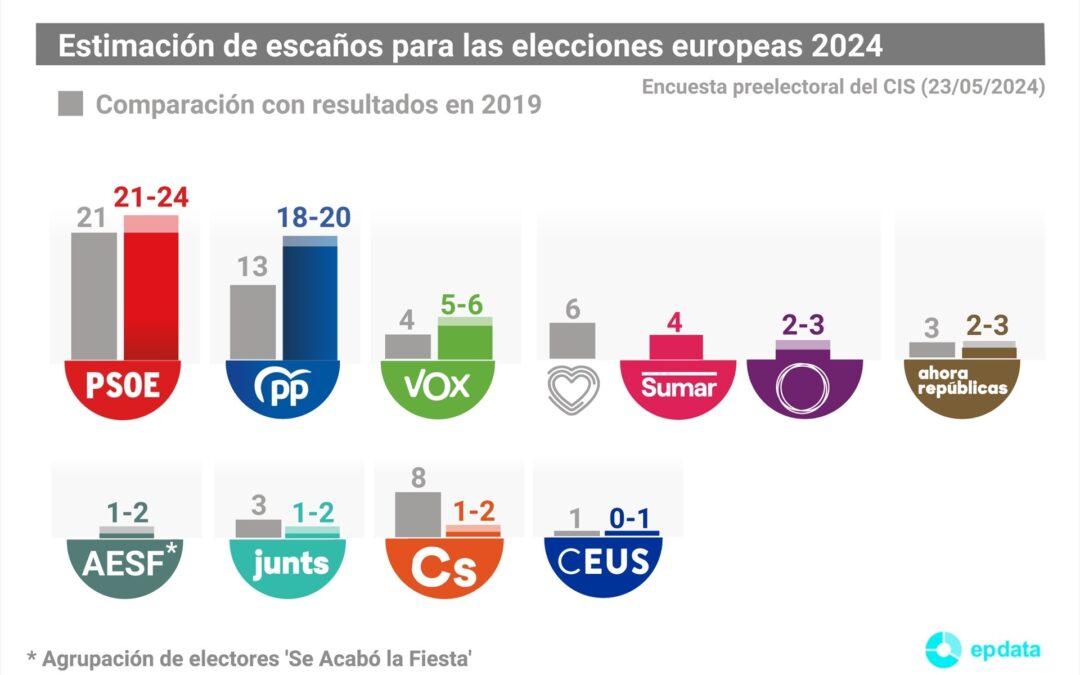Madrid – The campaign for the European elections, which will be held in Spain on June 9th, begins at midnight this Thursday with the PSOE as the favorite option of the Spanish people, five points ahead of the Popular Party (PP), according to the Spanish Center for Sociological Research (CIS).
The European elections will be the first national electoral event in which the major parties (PP and PSOE) will measure their strength since the general elections on July 23rd of last year, which brought Pedro Sánchez to the presidency of the Government thanks to an agreement with the Sumar formation.
Furthermore, after successive regional elections in Galicia, the Basque Country, and Catalonia, these European Parliament elections close an electoral cycle that, in principle, will not reopen in Spain for another two years.
Vox, the third political force in the Congress of Deputies, seeks to double its representation in Strasbourg, while Sumar faces the European elections as an opportunity to regain the electoral support lost in the latest regional elections. Finally, Podemos faces a crucial date to try to rearm itself on the tenth anniversary of its emergence on the political scene.
The CIS pre-electoral survey for the European elections, published this Thursday, places the PSOE at the top with a comfortable five-point lead over the PP, and grants seats to Podemos, Ciudadanos, and the ‘Se acabó la fiesta’ platform of the communicator Alvise Pérez.
Specifically, the CIS gives the PSOE an estimated vote of between 32.8% and 35.2% and a range of 21 to 24 seats, followed by the PP with a percentage between 27.9% and 30.2% and 18 to 20 MEPs.
Five years ago, the PSOE won the European elections with 33.18% and 20 seats, which months later rose to 21 following Brexit. According to the CIS survey, on this occasion, the socialists reiterate their 2019 victory and suffer little wear after five years in government, while the PP rises from the 20.35% it achieved in the previous European elections but fails to overturn the result.
Furthermore, the PSOE is the party with the most decided votes, with a direct voting intention of 27.3% compared to the PP’s 22.8%.
The third place is for Vox with five or six seats (between 8.6% and 10.1%), which brings it closer to its goal of doubling its 2019 representation when it only had 6.28% and three MEPs.
Next is Sumar, with four deputies and between 5.9% and 7.2%, and Podemos, which debuts separately with former minister Irene Montero at the helm and to which the CIS gives an estimated vote of between 4.4% and 5.4% and two or three seats. Five years ago, they all ran together as Unidas Podemos and achieved 10.17% and six MEPs.
The next formation is the coalition Ahora Repúblicas, which includes ERC, BNG, and Bildu among others, and to which the CIS grants an estimated vote of between 3.9% and 5%, with two or three seats. Five years ago, this same coalition, then led by Oriol Junqueras, garnered 5.64% and three MEPs.
As for the Catalan independence party Junts, the CIS attributes an estimated vote of between 2.2% and 3% with one or two seats, below the result obtained in 2019 by its leader Carles Puigdemont with 4.59% and two deputies (three after Brexit).
At risk, according to the CIS, is the Coalition for a Solidarity Europe (CEUS) led by the PNV, Canary Coalition, and Geroa Bai, which in 2019 had one seat with 2.85% and is now estimated to have support between 1.1% and 1.6% and between zero and one MEP.
The demoscopic institute keeps Ciudadanos alive, despite all polls placing it outside, and it did not win seats in the last Catalan elections. Also surprising is the ‘Se acabó la fiesta’ candidacy led by Andalusian communicator Luis ‘Alvise’ Pérez, to which the CIS gives an estimated vote of between 2.9% and 3.8% and one or two MEPs.
As for the leader ratings, the best rated, and the only one to pass, is the third vice-president of the Spanish Government and head of the PSOE list, Teresa Ribera, with a score of 5.3 points. Following her is former minister Dolors Montserrat, of the PP, with 4.5 points. The lowest ratings go to the independents Toni Comin (Junts), Diana Riba (ERC/AR), and nationalist Oihane Agirregoitia (PNV/CEUS) with 2.58, 2.82, and 2.86 points respectively.
The survey also shows that Spaniards consider the European elections to be of less importance than other general, regional, and municipal elections, and that when voting, two out of three voters take more into account what happens in Spain than in the whole of the European Union. However, 77% of respondents indicate that they have already decided their vote and that the election campaign will have little influence on them. (May 23)
 go to the original language article
go to the original language article
